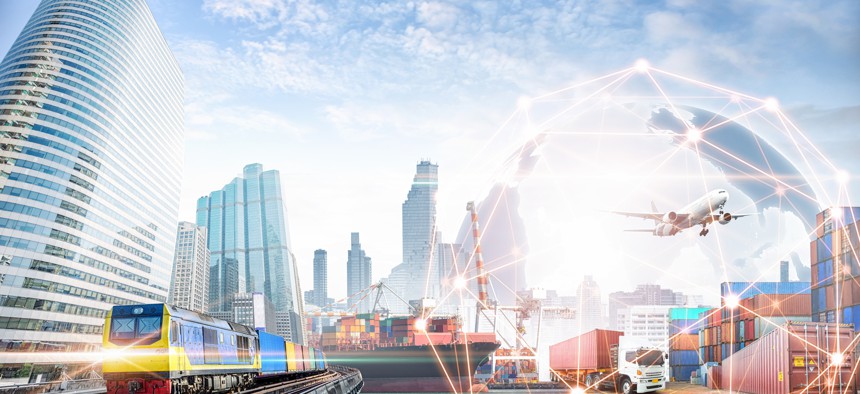Key Trends That Will Shape Infrastructure Decisions and Projects

iStock.com/Tryaging
The massive federal funds infusion and the pandemic are ushering in a greater need for cybersecurity precautions and broadband expansion, among other things, a new report details.
With $1.2 trillion in federal funds flowing to states and localities for infrastructure projects, there are several key trends shaping state and local government decisions and projects, according to a report released Wednesday from the Deloitte Center for Government Insights. The pandemic also will have a long-lasting impact on infrastructure.
"Every part of the infrastructure ecosystem … will need to adjust," according to the report.
Deloitte, the global consulting firm, conducted a survey last fall pertaining to U.S. infrastructure trends that included 660 total responses from government and infrastructure officials and a small number of private company and nonprofit executives from 18 countries. The largest sample, 300, was from the U.S.
The survey was conducted before the passage of the Infrastructure Investment and Jobs Act, and Deloitte said some answers could have differed if the survey was done later.
With the U.S. venturing into a new era of infrastructure spending, here are some of the key shifts underway, according to the Deloitte report:
- There will be a greater need for cybersecurity precautions as physical infrastructure takes on digital features. More than two-thirds of the survey respondents expect there will be a bigger focus on data security in the coming years. Nevertheless, federal officials are more confident about cybersecurity than their state and local counterparts, with more than one-in-four of those respondents saying infrastructure is vulnerable to cyberattacks.
- Technologies will reshape infrastructure. But the increasing use of artificial intelligence, cloud computing and cybersecurity means governments need to strengthen their privacy protocols, and the shortage of tech talent will be an issue.
- An increase in remote work will propel the need for broadband expansion. "If people are going to work from home more, obviously they need broadband access," Avi Schwartz, risk and financial advisory principal in Deloitte Transactions and Business Analytics LLP, told Route Fifty. "One of the things we saw in the pandemic is that it is not always easy [to connect], especially outside of urban environments,” said Schwartz, one of the report authors. “And even in urban environments, not everybody has the equipment needed to connect.”
- There will be greater emphasis on inclusive accessibility and environmental sustainability. Respondents said governments will increase investments in electric vehicle charging stations (60%), renewable energy (59%) and climate research (46%). But federal officials (58%) have a higher expectation than state leaders (32%) that the public sector will be promoting environmental justice.
Respondents said the most significant post-pandemic trends will include higher demand for broadband (42%), telework (39%), multimodal transportation (37%) and telemedicine (33%).
Burdensome Processes and Shortages Persist
While there are many expected shifts, the U.S respondents said they do not expect the way governments oversee infrastructure construction to drastically change. This means some of the typical challenges surrounding projects, such as complex regulations and court challenges, are likely to continue, the report says. In addition, few respondents said they expect changes to contracting methods or an increase in the public's participation in infrastructure decisions.
Meanwhile, data privacy and security risks will challenge new projects. The availability of qualified workers and materials and rising supply chain costs also were cited as problems.
For more information from the Deloitte report click here.
Andre Claudio is an assistant editor at Route Fifty.
NEXT STORY: Buttigieg to Republicans: States Can Decide How to Use Most Infrastructure Dollars





